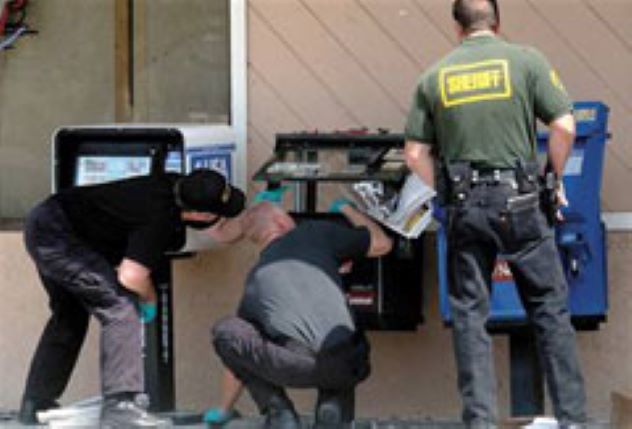 History
History  History
History  Weird Stuff
Weird Stuff 10 Wacky Conspiracy Theories You Will Need to Sit Down For
 Movies and TV
Movies and TV 10 Weird Ways That TV Shows Were Censored
 Our World
Our World 10 Places with Geological Features That Shouldn’t Exist
 Crime
Crime 10 Dark Details of the “Bodies in the Barrels” Murders
 Animals
Animals The Animal Kingdom’s 10 Greatest Dance Moves
 Movies and TV
Movies and TV 10 Box Office Bombs That We Should Have Predicted in 2025
 History
History 10 Extreme Laws That Tried to Engineer Society
 History
History 10 “Modern” Problems with Surprising Historical Analogs
 Health
Health 10 Everyday Activities That Secretly Alter Consciousness
 History
History 10 Dirty Government Secrets Revealed by Declassified Files
 Weird Stuff
Weird Stuff 10 Wacky Conspiracy Theories You Will Need to Sit Down For
 Movies and TV
Movies and TV 10 Weird Ways That TV Shows Were Censored
Who's Behind Listverse?

Jamie Frater
Head Editor
Jamie founded Listverse due to an insatiable desire to share fascinating, obscure, and bizarre facts. He has been a guest speaker on numerous national radio and television stations and is a five time published author.
More About Us Our World
Our World 10 Places with Geological Features That Shouldn’t Exist
 Crime
Crime 10 Dark Details of the “Bodies in the Barrels” Murders
 Animals
Animals The Animal Kingdom’s 10 Greatest Dance Moves
 Movies and TV
Movies and TV 10 Box Office Bombs That We Should Have Predicted in 2025
 History
History 10 Extreme Laws That Tried to Engineer Society
 History
History 10 “Modern” Problems with Surprising Historical Analogs
 Health
Health 10 Everyday Activities That Secretly Alter Consciousness
10 Marketing Stunts with Disastrous Consequences
Marketing is a tricky game. A lot of brands aren’t really selling anything anybody needs. A lot of promotion is about selling yourself as a company rather than the product you produce. This means brands have got to stay relevant, and they need to pull wacky stunts so that we notice them.
Mostly, these huge brands throw a bunch of money at a professional. The event passes by without any drama. Sometimes, though, they hire the wrong people, and it all goes disastrously wrong.
Related: 10 B.S. Myths We Believe Because Of Advertising
10 Jagermeister’s Pool Party
Imagine a Venn diagram with Jagermeister’s event team on the left and skilled chemists on the right. The middle section is likely sparse. In other words, best not to leave the Jagermeister team in charge of dangerous chemicals. At a brand promotion in Leon, Mexico, they proved they could not handle their liquid nitrogen well.
This particular event was a pool party in 2013 with about 200 young people in attendance. To increase the party atmosphere, the event managers decided that pouring liquid nitrogen over the swimming pool would create an awesome smoky effect. Unfortunately, they did not realize that liquid nitrogen combined with chlorine creates a toxic gas.
People soon started to fall unconscious. Never good news, but especially bad when a bunch of people are swimming. Fortunately, no one at the event died. However, a 21-year-old man ended up in a coma, and eight others were hospitalized.[1]
9 Dr. Pepper’s Treasure Hunt
Sometimes it’s hard to fathom how these marketing ideas were born into existence. In this case, Cadbury Schweppes (who owned the soda at the time) decided to put on a treasure hunt for their soft drink, Dr. Pepper. In 2007, they hid coins worth various amounts of money around the city. Participants needed to locate them using clues to get the cash prize.
One clue led to a graveyard. A 347-year-old graveyard in Boston that was the resting place for, among others, John Hancock, Samuel Adams, and Robert Treat Paine. You have, by this point, likely spotted the glaring issue. The city quickly stopped the hunt after contestants started descending on the burial site. Yes, because they were afraid these people might start digging the place up. Dr. Pepper apologized, stating the coin should not have “been placed in such a hallowed site.” Something that really should have been obvious before people were running into a cemetery with shovels.[2]
8 LG’s Accidental Riot
Yet another event that had not been thought through beyond the first move (it is unlikely many skilled chess players are on this list). In 2013, LG promoted an event where they would release 100 helium balloons, each containing a voucher for a free smartphone.
These were pricey smartphones that they were giving away—valued at more than $850US. Those that turned up were playing to win. When the balloons were released, the crowd underneath brought out BB guns and started firing. Twenty people were injured in the resulting scrum. LG decided it should probably cancel the remainder of similar events planned. Very wise.[3]
6
7 Domino’s Tattooed Giveaway
Domino’s bit off more than they could chew with a bizarre marketing strategy in Russia in 2018. They asked fans to get a tattoo of the company’s logo in a prominent place on their body. Photos of said tattoo uploaded to social media would win the contestant a lifetimes supply of pizza. Unfortunately, they did not seem to realize how many would take them up on that offer.
They had planned to run this campaign for two months and award the pizza to anyone with a tattoo they shared on Russia’s Facebook-like social media platform. However, after five days, they had received so many pictures of tattoos they had to change the campaign to the first 350 people instead. You sure wouldn’t want to be number 351 who hadn’t heard about the change of plans.[4]
6 Paramount’s Bomb Scares

Here we have another 1-D chess player. This time they took their idea to the L.A. streets. The Paramount marketing team, promoting the new Mission Impossible III, placed electronic devices in newspaper racks around the city. When the door was opened, they would play the theme music from the film.
Unfortunately, these devices looked an awful lot like homemade bombs. Many panicked citizens soon called the police. One news rack was blown up by the bomb squad in response to one of the suspected bomb reports. If this sounds a little extreme, know that this device was a plastic box with wires sticking haphazardly out of it attached to the inside of the newspaper boxes.
These were placed in 4,500 different newspaper vending machines, leaving the emergency services to field a lot of phone calls even after they were aware this was a music box. It caused more than a little outrage, and Paramount Pictures was subsequently sued. After an ensuing court case, Paramount was asked to pay $75,000 to settle negligence claims.[5]
5 Snapple’s Downtown Flood
In this story, event planners failed to realize ice might melt on a hot day. Snapple had launched a set of frozen treats and decided to promote it with a record-breaking stunt. They wanted to create the biggest popsicle ever made and stand it in downtown New York. This resulted in them trying to remove a 25-foot-tall, 17.5-ton ice sculpture on a stick from a freezer truck in Manhattan on a summer day in 2005.
Before they could even put the giant Snap-icle upright, it began to melt. Strawberry-kiwi pink goo began to flow down the streets. Police had to close down the road as onlookers made a run to higher ground. Brand representatives have stated that there will be no second attempt to break the record.[6]
4 Fiat’s Love Letters
In an ill-conceived stunt in Spain, Fiat mailed letters to 50,000 women claiming to be from a secret admirer. There was no signature. There was no indication of what or who was behind the letter. The letter pretended to be from someone who had noticed the woman while looking at them on the street. It further said, “I only need to be with you for a couple of minutes, and even if it doesn’t work out, I promise you won’t forget our little experience together.”
These were decidedly creepy letters to receive. Many women believed that they were being stalked. They stayed in their homes feeling fearful until a second letter arrived two weeks later. This letter explained that the first had been a marketing tactic and invited the women to their local Fiat dealer. The women, enraged, decided not to accept the offer. They decided it was more appropriate to sue Fiat instead.
These mail recipients won their case. However, the payout was quite small. Fortunately for Fiat, this campaign pre-dated the internet (1994), and so word of their creepy gaffe did not travel too far.[7]
3 Lay’s Rainy Days
Lay’s (chips), which are known as Walkers (crisps) in the UK, decided to run a campaign where participants could bet on when and where it would rain. Unfortunately, the company, owned by PepsiCo in the USA, did not realize how easy a competition this would be in the UK, where it rains pretty much all the time.
Many bets were soon being won. Although contestants only received a payout of £10 for a correct bet, soon payouts were over $600,000, and the company could not continue. Walkers attempted to change their rules halfway through, limiting how much participants could bet. This led to backlash and a strict warning from the UK Watchdog for advertising standards. They banned the campaign from taking place again.[8]
2 Amazon’s Nazi Trains
As a 2015 promotion stunt for The Man in the High Castle, their new TV show, Amazon plastered New York subway cars with themed decorations. Unfortunately, the show depicts the USA under Axis control in an alternate reality where Germany and Japan had won WWII. These themed decorations were versions of the Third Reich and Imperial Japan insignia.
On subway trains, seats and walls were entirely covered in these designs, including the American flag reimagined with the German Eagle and Iron Cross in place of the stars. They at least figured out not to include a swastika.
A spokesperson stated that advertising a show with this type of subject matter would always be difficult. Others deemed this move as pretty obviously insensitive and tasteless to plaster Nazi symbols inescapably all over the morning commute of the people of New York.[9]
1 Cartoon Network’s Shady Boxes
The Cartoon Network managed to cause chaos and panic across Boston with a marketing stunt—poor Boston; this one was also in 2007, the same as the Dr. Pepper cemetery fiasco from above.
The marketing company they had hired decided to set up adverts on the city streets. They had an artist create boxes with LED lights depicting a character—Mooninite—from Aqua Teen Hunger Force, a new show they were promoting, all over the city.
Many residents panicked at the sight of these and called emergency services. At least one of these devices was seen as so suspicious that it was detonated on site. Some residents thought that the panic was ridiculous and mocked it. They started a campaign placing stickers on devices like ATMs and parking meters reading “this is not a bomb.” Others, however, took it very seriously.
The artist behind the piece was arrested. Turner Broadcasting, the parent company of Cartoon Network, was ordered to pay out over $2 million to various security and law enforcement agencies that had been called out as a result.[10]

